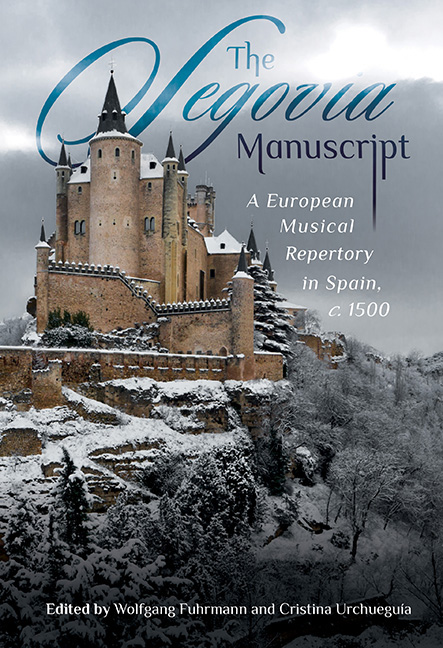Book contents
- Frontmatter
- Contents
- List of Illustrations
- Notes on Contributors
- Abbreviations
- Preambulum: A Source in Segovia
- 1 In Search of Origins: The Afterlife of a Renaissance Manuscript
- 2 New Light on the Segovia Manuscript: Watermarks, Foliation, and Ownership
- 3 Segovia's Repertoire: Attributions and Datings (with Special Reference to Jacob Obrecht)
- 4 What Was Segovia For?
- 5 The Latin Texts of the Segovia Manuscript
- 6 The Segovia Manuscript as Chansonnier
- 7 The Segovia Manuscript: Another Look at the ‘Flemish Hypothesis’
- 8 The Segovia Manuscript: Speculative Notes on the Flemish Connection
- 9 The Written Transmission of Polyphonic Song in Spain c. 1500: The Case of the Segovia Manuscript
- 10 Inventory of Segovia, Archivo Capitular de la Catedral, MS s.s.
- Bibliography
- Index of Compositions
- General Index
- Miscellaneous Endmatter
3 - Segovia's Repertoire: Attributions and Datings (with Special Reference to Jacob Obrecht)
Published online by Cambridge University Press: 29 March 2020
- Frontmatter
- Contents
- List of Illustrations
- Notes on Contributors
- Abbreviations
- Preambulum: A Source in Segovia
- 1 In Search of Origins: The Afterlife of a Renaissance Manuscript
- 2 New Light on the Segovia Manuscript: Watermarks, Foliation, and Ownership
- 3 Segovia's Repertoire: Attributions and Datings (with Special Reference to Jacob Obrecht)
- 4 What Was Segovia For?
- 5 The Latin Texts of the Segovia Manuscript
- 6 The Segovia Manuscript as Chansonnier
- 7 The Segovia Manuscript: Another Look at the ‘Flemish Hypothesis’
- 8 The Segovia Manuscript: Speculative Notes on the Flemish Connection
- 9 The Written Transmission of Polyphonic Song in Spain c. 1500: The Case of the Segovia Manuscript
- 10 Inventory of Segovia, Archivo Capitular de la Catedral, MS s.s.
- Bibliography
- Index of Compositions
- General Index
- Miscellaneous Endmatter
Summary
THE FLEMISH INFLUENCES
The Segovia manuscript has always been regarded as the first document of extensive Franco-Flemish musical influence on the Iberian peninsula, and the controversies surrounding its origin and function were largely rooted in this fact. It is especially the Flemish faction of internationally renowned composers that is massively represented here: Alexander Agricola boasts nineteen attributions and Henricus Isaac eighteen (probably nineteen if the first page of the Missa Wol auff gesell von hynnen were not lost). But no fewer than thirty-one works bear an ascription to ‘Jacobus Hobrecht’ in this source. This not only gives Obrecht the top position in Segovia's repertoire, but the manuscript also represents the summit among Obrecht sources; no other source contains so many Obrechtiana. Moreover, of these thirty-one ascriptions, only ten are confirmed elsewhere, and no fewer than eighteen compositions are transmitted solely in Segovia, whereas Isaac and Agricola come a distant second with six unica respectively. It is small wonder that Segovia has always been regarded as a source of special significance for the transmission of Obrecht's works.
The observation that the three composers best represented in Segovia were of Flemish, not French, origin neatly chimes with the demonstration that Segovia's scribe-compiler was most definitely Flemish. One cannot help but think that he must have maintained good contacts with at least one major musical centre in the Low Countries. (Joshua Rifkin and Honey Meconi speculate that he also had direct contact with Florence.) There is evidence that not only a large portion of the secular repertoire but also of the sacred pieces came from the Low Countries. For example, all of the eleven pieces ascribed to Isaac in Segovia with concordances elsewhere can be dated in the 1480s or early 1490s. Some of them may come from the early years of Isaac's Italian sojourn (as I will argue below), and some may be misattributions, but quite a few may be taken to confirm Martin Picker's view that they allow us some glimpses of the composer's early career in the Low Countries. Obrecht, of course, spent most of his career in the North, and this might suggest that the compiler of Segovia had easier access to his music than to that of Isaac and Agricola after they travelled south.
- Type
- Chapter
- Information
- The Segovia ManuscriptA European Musical Repertory in Spain, c.1500, pp. 91 - 128Publisher: Boydell & BrewerPrint publication year: 2019



